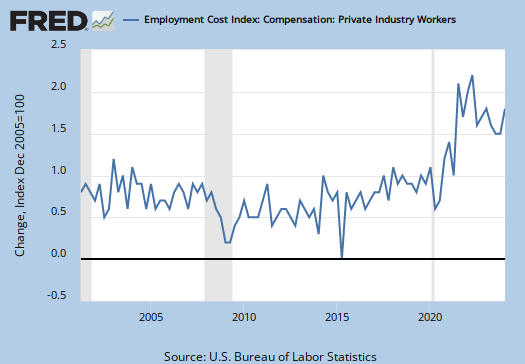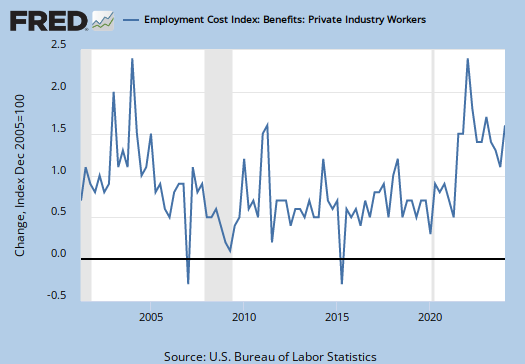Remember that phrase race to the bottom?
The latest Employment Cost Index (ECI), increase 0.4% for Q2, 2009. For the Year-to-Year we have a 1.8% increase, down from 3.2% for the previous year.

Employment Cost Index: Wages & Salaries: Private Industry Workers (change)
Compensation costs for private industry workers increased 1.5 percent for the 12-month period ending June 2009.
This is the smallest percent change published for this series since it began in 1980. The deceleration of cost increases was evident in both wages and salaries as well as benefits, registering the smallest increases published in the series history. The wage and salary series, which began in 1975, increased 1.6 percent for the current 12-month period.

Employment Cost Index: Wages & Salaries: Private Industry Workers (change)
Also, Employer Costs for Employee Compensation (ECEC) gives some insight on how much health care costs employers:
Health insurance benefit costs increased, both in average hourly dollar amount and as a proportion of total compensation, with establishment size. Establishments with fewer than 50 workers averaged $1.30 (6.0 percent), those with 50-99 workers averaged $1.76 (7.1 percent), those with 100-499 employees averaged $2.22 (7.9 percent), and those with 500 or more employees averaged $3.19 (8.2 percent)
.

Employment Cost Index: Benefits: Private Industry Workers (change)
I do not know if these statistics have removed those employers who do not pay for health insurance.
This CBS MarketWatch article blames the possibility of inflation on workers as well as claims wages are deflationary.
The report shows labor costs are a disinflationary force. Since the recession began in the fourth quarter of 2007, private-sector compensation has slowed from a 0.9% quarter-to-quarter growth to a record-low 0.2% in the two most recent quarters.
Under the most-widely accepted theory of inflation, slow-growing or stagnant wages make any sustained inflation unlikely. It is only when workers have the power to demand big cost-of-living adjustments that an inflationary spiral is possible.
Is that true? Seems to me in a series of hyperinflation events, people were left literally starving, obviously not keeping up with the cost of living.

But PCE Price Index
The personal consumption expenditure price index for 2nd quarter 2009 increased 1.3%.
RebelCapitalist.com - Financial Information for the Rest of Us.
RebelCapitalist.com - Financial Information for the Rest of Us.